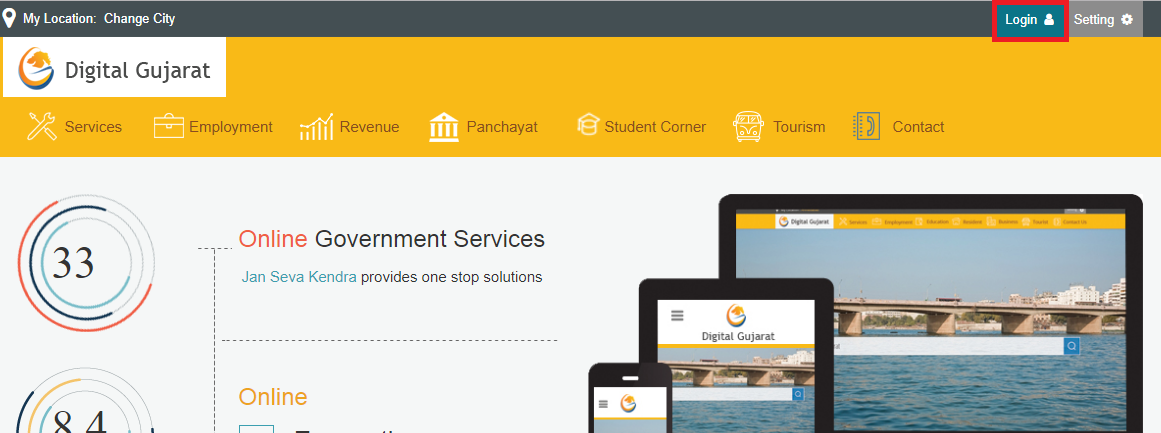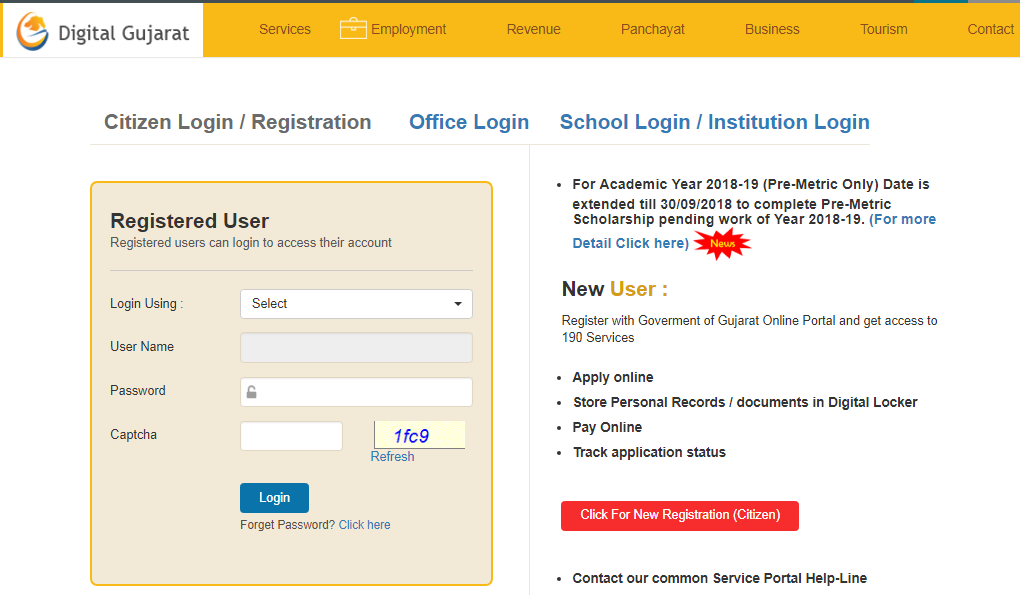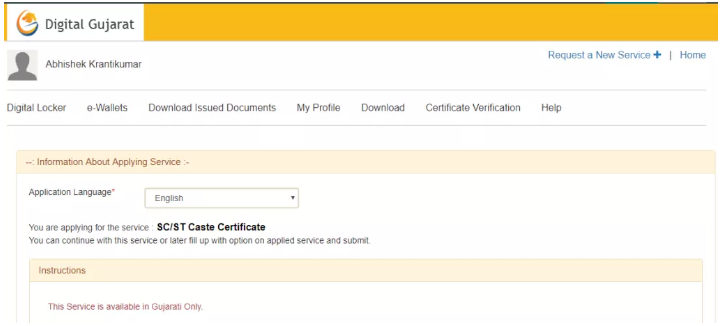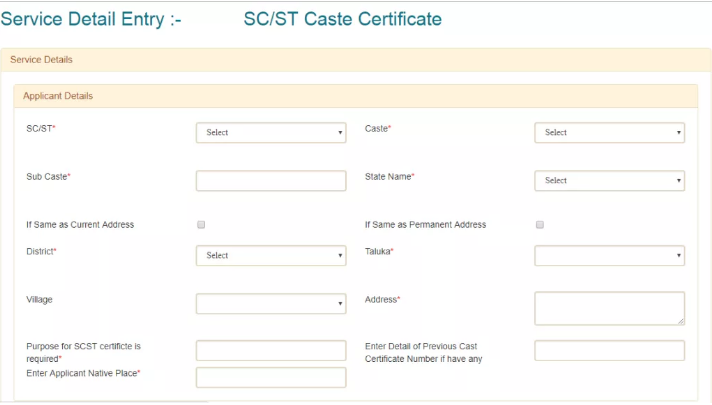 Last updated: November 15th, 2024 2:10 PM
Last updated: November 15th, 2024 2:10 PM
Gujarat Caste Certificate
The Government grants caste certificate to certify officially that a person belongs to a specific caste or community under the constitution of India. Caste certificate (SC/ST) is issued by the respective State Governments to its residents belonging to scheduled caste, scheduled tribe and other backward community. Therefore, it is recommended that people belonging to such caste obtain a caste certificate to take benefit of reservations provided by the Government. In this article, we look at the application procedure for obtaining Gujarat caste certificate in detail.Purpose of the Certificate
Any individual reserved under the Scheduled Caste, Scheduled Tribe category can apply for a caste certificate and should obtain the caste certificate for various purposes. Some of the purposes are below.- Caste certificate is important for students to avail seats under reserved quotas in certain educational institutions and Government entities.
- A caste certificate is required for fee concessions in schools/colleges.
- To benefit from scholarships provided by the Government.
- The Government requires a caste certificate to disburse subsidies for special reservations.
- In terms of employment, caste certificate is obligatory for job seekers, who apply for Government jobs as appointments under reserved quotas.
- To apply for schemes implemented by the Government exclusively for the underprivileged, caste certificate is necessary.
- Caste Certificate must be provided to reserve seats in the Legislatures.
Eligibility Criteria to get Gujarat Caste Certificate
The eligibility criteria for a person to obtain caste certificate from Gujarat are below.- The applicant should be a citizen of India.
- Applicant should be a permanent resident of the state for a minimum period of five years to obtain a caste certificate in Gujarat.
- The name of the applicant should be in the SC/ST, SEBC and OBC list issued by the Government of Gujarat to apply for caste certificate.
Documents Required
To apply for the caste certificate in Gujarat, submit the following documents with the application. The mentioned documents must be attached along with the application form when applying offline while online application requires scanned copies of the same.- Proof of residence - Ration Card, True Copy of Election Card
- Proof of Identity - Driving License, PAN Card
- Proof of Caste
-
- Certificate of the caste or the family member with Pedhinamu (Family Tree issued by Talati)
- A true copy of the certificate of caste given by sarpanch/patwari(Talati) cum Mantri of the Gram Panchayat
- A true copy of the certificate of caste given by the head of Nagarpalika/Chief Officer
- Relationship Proof – affidavit of the person
- Passport size photograph.
Concerned Authority
For an urban area, the concerned Zonal officer is responsible for the issuance and verification of Scheduled Caste / Scheduled Tribe certificate in the state of Gujarat. For a rural area, concerned Mamlatdar (Head of Taluka) is responsible for the issuance and verification of Scheduled Caste / Scheduled Tribe certificate in the state of Gujarat.Validity
The Government of Gujarat has extended the validity of caste certificate issued to its citizens for three years.Fees
The fee to obtain a caste certificate in Gujarat is Rs.20.Processing Time
The concerned authority will issue the caste certificate within 1 day from the submission of the application.Application Procedure to obtain Gujarat Caste Certificate
The person applying for the caste certificate can apply in either online or offline mode.Offline Application Process
Step 1: The applicant should visit the Mamlatdar/Talati or Jan Seva Kendra office and collect the application form. The applicant can also download the application form from the copy provided below. Step 2: Fill the application and attach the necessary documents for the approval. If there is a requirement of Javab Panch Namu in the form, the applicant should take two people for verification to the concerned office. If proof of caste is not available, an affidavit as defined in the form must be issued from the concerned office. Step 3: In case of possessing a caste proof or if Javab Panch Namu is not required in the form, the applicant can directly go to the office of the Collector & District Magistrate to submit the filled form together with documents. Then the applicant has to remit the fee in the submitting office. Step 4: The applicant can collect the certificate approved by the authority after one day.Online Application Process
Digital Gujarat Step 1: To apply online, visit the official website of Digital Gujarat of the Gujarat State Government. Click Login on the top of the Home page of the website. [caption id="attachment_58557" align="aligncenter" width="1161"] Gujarat-Caste-Certificate-Home-Page
New Citizen Registration
Step 2: To access online services offered by the Gujarat government, the citizen must be a registered user.
If a person is not registered on the digital portal of Gujarat, he/ she need to register himself/ herself on the digital portal. This can be done by clicking on the ‘Click for new registration’ under New user on the website.
[caption id="attachment_58558" align="aligncenter" width="1020"]
Gujarat-Caste-Certificate-Home-Page
New Citizen Registration
Step 2: To access online services offered by the Gujarat government, the citizen must be a registered user.
If a person is not registered on the digital portal of Gujarat, he/ she need to register himself/ herself on the digital portal. This can be done by clicking on the ‘Click for new registration’ under New user on the website.
[caption id="attachment_58558" align="aligncenter" width="1020"] Gujarat-Caste-Certificate-User-Registration
Step 3: The user registration page appears. Fill out the necessary details and click submit.
Login
Step 4: Then, the citizen can log in using any of the following:
Gujarat-Caste-Certificate-User-Registration
Step 3: The user registration page appears. Fill out the necessary details and click submit.
Login
Step 4: Then, the citizen can log in using any of the following:
- E-mail id
- Aadhaar number
- Mobile number
 Gujarat-Caste-Certificate-Applying-Service
Fill Application Form
Step 7: Applicant should furnish the following information.
Gujarat-Caste-Certificate-Applying-Service
Fill Application Form
Step 7: Applicant should furnish the following information.
- Applicant information (Basic applicant details, Occupational Details, Family details)
- Service details (caste details)
 Gujarat-Caste-Certificate-Application-Form
Step 8: Upload the scanned copies of the document and click submit.
Step 9: After the successful submission of your application, Take the print of the application form and proceed further with the online payment.
Payment
Step 10: There are two payment options:
1) Using E-Wallet
2) Using Gateway
Step 11: Select the payment option and click on the “Send OTP” button in order to make payment. Further, the citizen will receive a one-time password to the mobile.
Step 12: After entering the one-time password, click on the “Confirm” button to complete the payment process.
Note: All fields marked with *(star) are mandatory fields in Online Application.
In case of any wrong/misleading information provided in the application shall lead to rejection of the application by Department Authorities.
Gujarat-Caste-Certificate-Application-Form
Step 8: Upload the scanned copies of the document and click submit.
Step 9: After the successful submission of your application, Take the print of the application form and proceed further with the online payment.
Payment
Step 10: There are two payment options:
1) Using E-Wallet
2) Using Gateway
Step 11: Select the payment option and click on the “Send OTP” button in order to make payment. Further, the citizen will receive a one-time password to the mobile.
Step 12: After entering the one-time password, click on the “Confirm” button to complete the payment process.
Note: All fields marked with *(star) are mandatory fields in Online Application.
In case of any wrong/misleading information provided in the application shall lead to rejection of the application by Department Authorities.
Application Status
Citizen does not need to visit the nearest JSK/ATVT centre to verify the profile/document after successfully submitting the application. The citizen will receive a notification through an SMS on the status of his/her application.Popular Post

In the digital age, the convenience of accessing important documents online has become a necessity...

The Atalji Janasnehi Kendra Project that has been launched by the Government of Karnataka...

The Indian Divorce Act governs divorce among the Christian couples in India. Divorce...

When an individual has more than a single PAN card, it may lead to that person being heavily penalised, or worse,...

Employees Provident Fund (PF) is social security and savings scheme for employee in India. Employers engaged...


